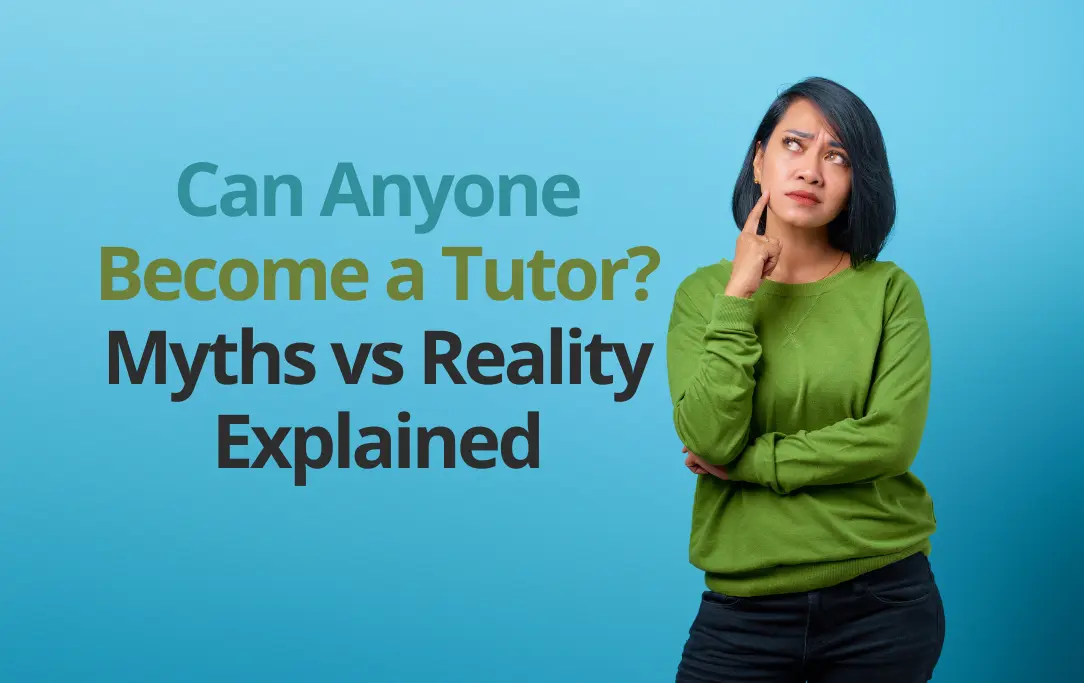Can Anyone Become a Tutor? Myths vs Reality Explained

Can Anyone Become a Tutor Myths vs Reality is a question asked by many people who want to step into teaching. Tutoring has become one of the most flexible and rewarding opportunities in recent years. With the rise of online education, anyone with knowledge or skills can share them and earn while doing so. But the truth is, there are many myths about tutoring that stop people from even trying. Some believe you need advanced degrees, years of teaching experience, or expensive certifications to become a tutor. Others think tutoring is only for academic subjects like math or science.
The reality of becoming a tutor is different. You do not always need a degree or formal experience to start. What matters more are your subject knowledge, communication skills, and the ability to guide learners. From helping with school subjects to teaching music, art, or even coding, tutoring offers countless opportunities. In fact, tutoring as a side hustle is now one of the most accessible ways to earn flexible income.
In this blog, we will break down the myths and facts. You will see a clear tutoring reality check that separates what people think from how things truly work. We will explain the requirements to become a tutor, the skills required to be a tutor, and the steps to get started. We will also answer common misconceptions about tutoring, including “Do tutors need a degree?” and “Can you be a tutor without certification?”. By the end, you will know exactly who can be a tutor, how to start tutoring online, and why platforms like the OEG tutoring platform for new tutors make the process simple.
Download the App Now on Play Store if you are also looking for to Become a Tutor
Stay connected, stay informed, stay ahead with this OEG website for Become a Tutor
Why the Question Matters: Can Anyone Become a Tutor?
This question is important because tutoring is not limited to traditional teachers. Students, professionals, freelancers, and retirees all ask if they qualify. Many wonder about tutoring without teaching experience, and the internet is full of online tutoring myths that create confusion.
By asking this question, people want to know two things:
What are the myths about tutoring?
What is the actual reality of becoming a tutor?
The following sections will separate myths vs facts and provide a complete tutoring reality check.
Common Myths About Tutoring
Many false beliefs prevent talented people from starting. Below are the most common misconceptions about tutoring:
You must be a certified teacher.
Only people with advanced degrees can tutor.
Tutoring is limited to academics.
Tutors must have years of experience.
Online tutoring is not as effective as in-person.
Students only want tutors with high-level qualifications.
The Reality of Becoming a Tutor
Now let’s look at the facts. Here is the reality of becoming a tutor:
You do not always need certification. Many tutors work without official teaching certificates.
Degrees are not always required. Do tutors need a degree? Not in every case. Subject knowledge matters more.
Tutoring covers many fields. Music, languages, coding, and test prep are all in demand.
Beginners can start small. Tutoring for beginners is possible with free tools and practice.
Online tutoring is growing fast. Many parents and students prefer it for convenience and affordability.
Students want clarity, not titles. Good communication is more valuable than long resumes.
Myths vs Facts: Quick Comparison
| Tutoring Myths | Tutoring Reality Check |
|---|---|
| Only certified teachers can tutor | Many tutors succeed without certification |
| Tutors need a degree | Many subjects need skill, not degrees |
| Tutoring is only for academics | Creative skills and hobbies are also in demand |
| You must have experience | Beginners can start with basic tutoring |
| Online tutoring is ineffective | Online tutoring is growing as a trusted option |
Who Can Be a Tutor?
One of the biggest questions is: Who can be a tutor? The answer is simple. Anyone with useful knowledge and the ability to explain it clearly can start. You do not need to be a professional teacher.
Examples of people who become tutors:
College students helping school learners.
Professionals teaching subjects like finance, IT, or business.
Artists and musicians sharing creative skills.
Retirees with knowledge in history, literature, or other fields.
Skills Required to Be a Tutor
Tutoring qualifications explained are less about formal papers and more about skills. Here are the essential ones:
Strong subject knowledge
Good communication skills
Patience with learners
Ability to explain complex topics simply
Adaptability to different learning styles
Organization and time management
These matter more than a university degree in most cases.
Do You Need a Degree or Certification?
Many ask: Do tutors need a degree? The truth is that it depends on the subject. Academic test prep may require higher qualifications, but tutoring without teaching experience or certification is possible in many cases.
Academic subjects: Often easier with a degree, but not always mandatory.
Languages, music, or art: Skills matter more than certificates.
Online tutoring platforms: Some require degrees, others do not.
So, can you be a tutor without certification? Yes, in many cases. What matters is proving your skill and building trust with learners.
Tutoring for Beginners: How to Start
If you are new, here are steps for tutoring for beginners:
Identify your subject or skill.
Decide if you want to teach online or in person.
Choose a tutoring platform like the OEG tutoring platform for new tutors.
Set affordable starting rates.
Gather testimonials from first students.
Build a simple profile showcasing your skills.
This process makes becoming a private tutor accessible to anyone.
Tutoring Myths vs Facts in Online Education
Online tutoring myths often make people doubt virtual learning. Common ones include “online learning is less effective” or “only weak students use tutors.”
The facts:
Online tutoring can be equally effective as in-person when done right.
Both high achievers and struggling students use tutors.
Technology makes learning interactive and flexible.
Tutoring as a Side Hustle
Many people now see tutoring as a side hustle. Flexible hours and the ability to work from home make it attractive. It is also low-cost to start compared to other businesses.
Requirements to Become a Tutor
There are no universal rules, but here are typical requirements to become a tutor:
Knowledge in a subject or skill.
Ability to teach at a student’s level.
Reliability and consistency.
Sometimes, proof of degree (depends on platform).
How to Start Tutoring Online
Here is a step-by-step guide on how to start tutoring online:
Choose your subject or niche.
Pick a tutoring platform or create your own profile.
Set up video tools like Zoom or Google Meet.
Decide pricing and schedule.
Market yourself through social media and referrals.
OEG Tutoring Platform for New Tutors
The OEG tutoring platform for new tutors makes the process easy. It connects tutors with students seeking help in various subjects. Whether you are interested in becoming a private tutor or exploring tutoring as a side hustle, OEG provides the tools to succeed.
Key benefits:
Easy sign-up for beginners.
Wide subject categories.
Flexible scheduling.
Safe and reliable payments.
Download the App Now on App Store if you are also looking for to Become a Tutor
Stay connected, stay informed, stay ahead with this OEG website for Become a Tutor
Final Thoughts:
So, can anyone become a tutor? Yes, but with a clear understanding of myths vs facts. The main takeaway is that tutoring is not only for certified teachers or degree holders. What matters is your ability to explain, support, and guide students.
By breaking the myths about tutoring and understanding the reality of becoming a tutor, you can start your journey today. With the right skills, dedication, and support from platforms like OEG, anyone can share knowledge and earn from tutoring.
Yes. Anyone with knowledge, skills, and patience can tutor. Formal teaching experience is not always required.
Not always. A degree helps in some academic areas, but skills matter most in many fields.
Yes. Many tutors work without official certification, especially in online or skill-based tutoring.
The main myths are that only teachers can tutor, a degree is required, and tutoring is only for academics.
Choose a subject, set up your profile, and join a platform like OEG to find students.










